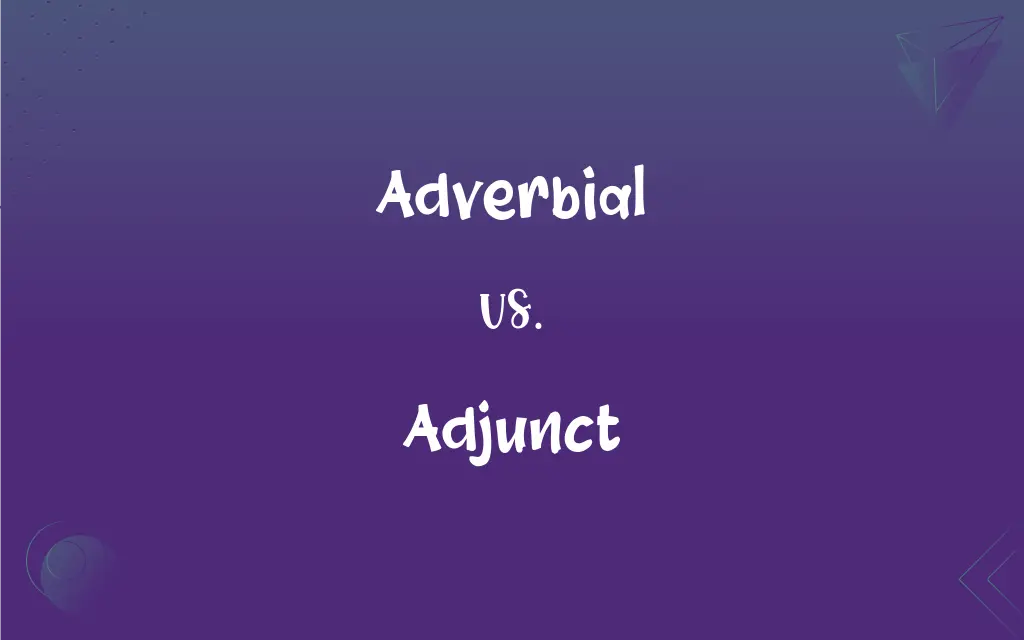Adverbial vs. Adjunct: What's the Difference?
By Harlon Moss & Aimie Carlson || Updated on May 28, 2024
Adverbial modifies verbs, adjectives, or other adverbs, describing manner, place, time, or degree. Adjunct is a type of adverbial that provides additional, non-essential information to a sentence.

Key Differences
Adverbial refers to a word or phrase that modifies verbs, adjectives, or other adverbs, describing how, when, where, or to what extent an action occurs. For example, in the sentence "She sings beautifully," the word "beautifully" is an adverbial modifying the verb "sings." Adjunct, on the other hand, is a type of adverbial that adds extra, non-essential information to a sentence. This additional information can often be omitted without altering the fundamental meaning of the sentence. For instance, in "She sings beautifully in the morning," the phrase "in the morning" is an adjunct.
While all adjuncts are adverbials, not all adverbials are adjuncts. Adverbials can also be complements, which are necessary to complete the meaning of the verb. For example, in "She put the book on the table," "on the table" is an adverbial complement necessary for the sentence to make sense.
Adjuncts are typically more flexible in their placement within the sentence and can be moved around or omitted without impacting the sentence's core meaning. They enrich the sentence by providing additional details such as time, place, manner, reason, or condition, enhancing the overall context.
Adverbials modify verbs and other elements to give more detail about actions, while adjuncts specifically provide optional, extra information that enhances but is not critical to the sentence's meaning.
Comparison Chart
Definition
Modifies verbs, adjectives, or adverbs
Type of adverbial providing non-essential information
ADVERTISEMENT
Essential Information
Can be essential or non-essential
Always non-essential
Function
Describes manner, place, time, or degree
Adds extra context such as time, place, or reason
Sentence Impact
Can be necessary for complete meaning
Can be omitted without changing core meaning
Example Sentence
"She sings beautifully."
"She sings beautifully in the morning."
Adverbial and Adjunct Definitions
Adverbial
Describes the manner, place, time, or degree of an action.
She will arrive soon.
ADVERTISEMENT
Adjunct
A type of adverbial that adds non-essential information.
She sings in the morning.
Adverbial
A word or phrase that modifies a verb, adjective, or another adverb.
He ran quickly.
Adjunct
Can be omitted without altering the core meaning of the sentence.
They spoke quietly in the library.
Adverbial
Can function as adverbial complements necessary for the verb.
He put the keys on the table.
Adjunct
Enhances the sentence with extra details.
She studied diligently last night.
Adverbial
Provides essential or non-essential details about the action.
They spoke quietly.
Adjunct
Something attached to another in a dependent or subordinate position.
Adverbial
Adds information to enhance the meaning of a sentence.
She sings beautifully.
Adjunct
A person associated with another in a subordinate or auxiliary capacity.
Adverbial
Of, relating to, or being an adverb.
Adjunct
(Grammar) A clause or phrase added to a sentence that, while not essential to the sentence's structure, amplifies its meaning, such as for several hours in We waited for several hours.
Adverbial
An adverbial element or phrase.
Adjunct
(Logic) A nonessential attribute of a thing.
Adverbial
(grammar) Of or relating to an adverb.
Adjunct
Added or connected in a subordinate or auxiliary capacity
An adjunct clause.
Adverbial
(grammar) An adverbial word or phrase.
Adjunct
Attached to a faculty or staff in a temporary or auxiliary capacity
An adjunct professor of history.
Adverbial
Of or pertaining to an adverb; of the nature of an adverb; as, an adverbial phrase or form.
Adjunct
An appendage; something attached to something else in a subordinate capacity.
Adverbial
A word or group of words function as an adverb
Adjunct
A person associated with another, usually in a subordinate position; a colleague.
Adverbial
Of or relating to or functioning as an adverb;
Adverbial syntax
Adjunct
(brewing) An unmalted grain or grain product that supplements the main mash ingredient.
Adjunct
A quality or property of the body or mind, whether natural or acquired, such as colour in the body or judgement in the mind.
Adjunct
(music) A key or scale closely related to another as principal; a relative or attendant key.
Adjunct
(grammar) A dispensable phrase in a clause or sentence that modifies its meaning.
Noun adjunct
Adjunct
A constituent which is both the daughter and the sister of an X-bar.
Adjunct
(rhetoric) Symploce.
Adjunct
(category theory) One of a pair of morphisms which relate to each other through a pair of adjoint functors.
Adjunct
Connected in a subordinate function.
Adjunct
Added to a faculty or staff in a secondary position.
Adjunct
Conjoined; attending; consequent.
Though that my death were adjunct to my act.
Adjunct
Something joined or added to another thing, but not essentially a part of it.
Learning is but an adjunct to our self.
Adjunct
A person joined to another in some duty or service; a colleague; an associate.
Adjunct
A word or words added to quality or amplify the force of other words; as, the History of the American Revolution, where the words in italics are the adjunct or adjuncts of "History."
Adjunct
A quality or property of the body or the mind, whether natural or acquired; as, color, in the body, judgment in the mind.
Adjunct
Something added to another thing but not an essential part of it
Adjunct
A person who is an assistant or subordinate to another
Adjunct
A construction that is part of a sentence but not essential to its meaning and can be omitted without making the sentence ungrammatical
Adjunct
Relating to something that is added but is not essential;
An ancillary pump
An adjuvant discipline to forms of mysticism
The mind and emotions are auxilliary to each other
Adjunct
Of or relating to a person who is subordinate to another
Adjunct
Provides additional context such as time, place, manner, or reason.
He left without saying goodbye.
Adjunct
Flexible in sentence placement and often optional.
In the morning, she sings.
FAQs
How does an adjunct differ from an adverbial?
An adjunct is a type of adverbial that provides additional, non-essential information to the sentence.
What is an adverbial?
An adverbial is a word or phrase that modifies verbs, adjectives, or other adverbs, describing aspects like manner, place, time, or degree.
Can you give an example of an adverbial?
E.g., "He drives carefully."
Are all adverbials adjuncts?
No, while all adjuncts are adverbials, not all adverbials are adjuncts; some can be complements.
What is a complement in terms of adverbials?
An adverbial complement is necessary to complete the meaning of the verb, such as "She put the book on the table."
Can adjuncts be omitted from sentences?
Yes, adjuncts can be omitted without changing the core meaning of the sentence.
What types of information do adjuncts provide?
Adjuncts provide extra context such as time, place, manner, reason, or condition.
What is an example of an adjunct?
E.g., "He drives carefully on weekends."
Do adverbials always modify verbs?
No, adverbials can also modify adjectives and other adverbs.
Can an adverbial be essential to a sentence?
Yes, adverbials can be essential when they function as complements.
Is "quickly" in "She runs quickly" an adjunct?
No, "quickly" is an adverbial but not necessarily an adjunct since it describes how she runs.
Are adjuncts flexible in their sentence placement?
Yes, adjuncts can often be moved within the sentence without changing the meaning.
Do all sentences need adverbials?
No, not all sentences require adverbials; they are used to add detail when needed.
Is "loudly" in "He spoke loudly" an adjunct?
No, "loudly" is an adverbial modifying the verb "spoke" but not necessarily an adjunct.
Do adjuncts affect the core meaning of a sentence?
No, they add additional information but do not affect the core meaning.
Is "yesterday" in "She left yesterday" an adjunct?
Yes, "yesterday" is an adjunct providing extra context about time.
Is "in the morning" in "She jogs in the morning" an adjunct?
Yes, "in the morning" is an adjunct because it provides extra, non-essential information.
Can adverbials describe degree?
Yes, adverbials can describe the degree of an action, such as "very" in "very fast."
Can adverbials modify entire clauses?
Yes, adverbials can modify entire clauses to provide additional context.
Can a single word be an adjunct?
Yes, single words like "yesterday" or "outside" can function as adjuncts in a sentence.
About Author
Written by
Harlon MossHarlon is a seasoned quality moderator and accomplished content writer for Difference Wiki. An alumnus of the prestigious University of California, he earned his degree in Computer Science. Leveraging his academic background, Harlon brings a meticulous and informed perspective to his work, ensuring content accuracy and excellence.
Co-written by
Aimie CarlsonAimie Carlson, holding a master's degree in English literature, is a fervent English language enthusiast. She lends her writing talents to Difference Wiki, a prominent website that specializes in comparisons, offering readers insightful analyses that both captivate and inform.
































































